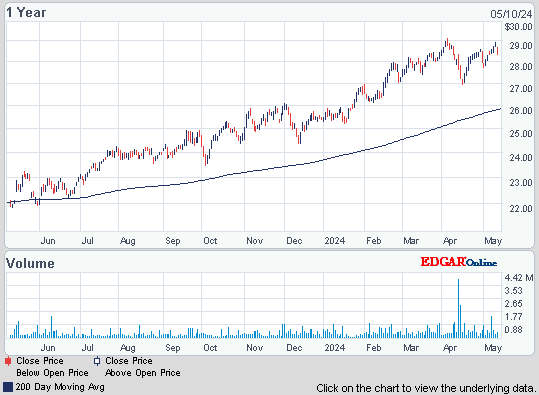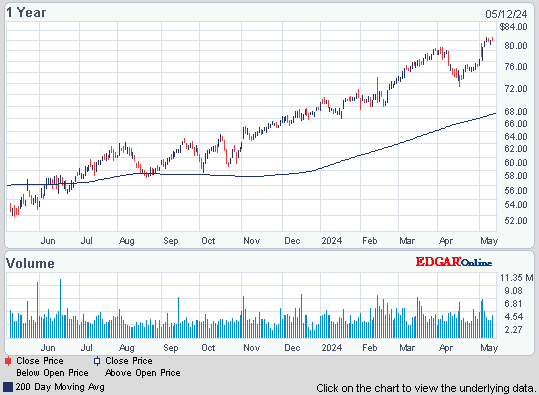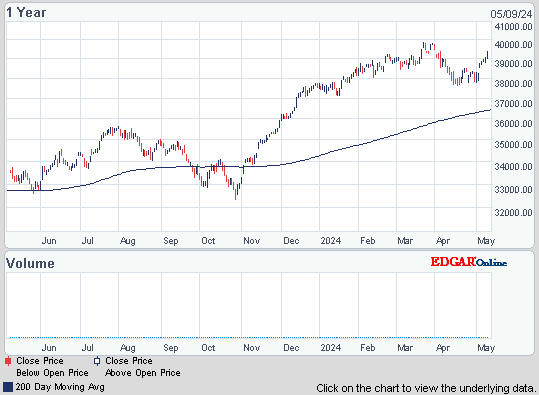Stocks held up well in what had been a tough day overseas. Dow slipped 29, advancers barely ahead of decliners & NAZ was up 1. Bank stocks did well, taking the Financial Index up almost 2+ to 204. Losses for MLPs were pared in the PM, but the index still fell a very big 4 to the 389s, & the REIT index rose almost 2 to 261 (4 below its 2012 high). Junk bond funds were weak & Treasuries rose as the 10-year bond yield touched a 3-month low on safe-asset demand after elections in France & Greece raised concern govs will drop deficit-cutting plans used to combat the region’s debt crisis. That thinking brought selling in oil & gold (although gold should have benefited).

![Live 24 hours gold chart [Kitco Inc.]](http://www.kitco.com/images/live/gold.gif)

The head of the IMF urged indebted countries in Europe & elsewhere to reduce budget deficits only gradually to avoid further damaging their economies. Christine Lagarde said that steep cuts tend to slow an economy, particularly if a nation is already suffering from weak growth. The speech came one day after voters in France & Greece rejected govs associated with cuts in social spending & other austerity steps. The appropriate path is country-specific, she said. "Some countries under severe market pressure have no choice but to move faster," she said. "On the whole, however, adjustment should be gradual and steady." Many European countries have been trying to reduce debt loads as a percentage of their economies. When they have taken steps to cut deficits, such as raising taxes or cutting spending, their economies have shrunk, making it harder to reduce deficits as a percentage of their economy. Lagarde urged govs to avoid that trap. Instead, they should focus on gradually reducing debt levels & not cutting further if the economy weakens. "There is no avoiding this brake of fiscal adjustment," she said in a prepared version of her remarks. "But if calibrated correctly, we can make sure it doesn't do too much harm to growth." Sounds good, but countries still have to learn how to deal with out of control social spending.
IMF chief urges gradual approach to spending cuts AP
JPMorgan Chase Capital XVI (AMJ)
Click below for the latest market update:
Treasury yields:
U.S. 3-month | 0.076% | |
U.S. 2-year | 0.254% | |
U.S. 10-year | 1.875% |
| CLM12.NYM | Crude Oil Jun 12 | 97.94 |
![Live 24 hours gold chart [Kitco Inc.]](http://www.kitco.com/images/live/gold.gif)

The head of the IMF urged indebted countries in Europe & elsewhere to reduce budget deficits only gradually to avoid further damaging their economies. Christine Lagarde said that steep cuts tend to slow an economy, particularly if a nation is already suffering from weak growth. The speech came one day after voters in France & Greece rejected govs associated with cuts in social spending & other austerity steps. The appropriate path is country-specific, she said. "Some countries under severe market pressure have no choice but to move faster," she said. "On the whole, however, adjustment should be gradual and steady." Many European countries have been trying to reduce debt loads as a percentage of their economies. When they have taken steps to cut deficits, such as raising taxes or cutting spending, their economies have shrunk, making it harder to reduce deficits as a percentage of their economy. Lagarde urged govs to avoid that trap. Instead, they should focus on gradually reducing debt levels & not cutting further if the economy weakens. "There is no avoiding this brake of fiscal adjustment," she said in a prepared version of her remarks. "But if calibrated correctly, we can make sure it doesn't do too much harm to growth." Sounds good, but countries still have to learn how to deal with out of control social spending.
IMF chief urges gradual approach to spending cuts AP
US consumer spending surged in Mar by the most in more than a decade on growing demand for educational financing & autos. Credit rose $21.4B, the biggest gain since Nov 2001, to $2.54T, according to the Federal Reserve. The advance was paced by a $16.2B jump in non-revolving debt, including student & car loans. Americans may have been trying to get school financing before a possible increase in interest rates takes place on Jul 1. Increasing consumer confidence also means that households are more willing to take on debt to boost spending. The increase in consumer credit topped the $9.8B forecast & even exceeded the highest estimate $15B. The surge in non-revolving debt followed a $11.6B gain in Feb. The data doesn’t track debt secured by real estate, such as home equity lines of credit. Lending by the federal gov, which is mainly for student loans, climbed by $6.9B. The rate on the student loans is set to double on Jul 1 without action by Congress. The increase would affect about 7.4M students, adding an average of $1K a year in payments on college loans. As mentioned above, cutting gov spending is difficult when it involves stepping on "my" toes.
Consumer Credit in U.S. Rose in March by Most in Over 10 Years

Photo: Bloomberg
The Treasury agreed to sell $5B of its stock holding in AIG, with the bailed-out insurer buying $2B of the total. The Treasury will sell 164M shares at $30.50 each, compared with a closing price of $32.83 on Fri. This is its 3rd offering of AIG shares in the last year, which reduces the Treasury’s stake to 63% from 70%. AIG has sold assets to help raise funds to buy back shares. The Treasury raised $5.8B in the first offering in 2011. At the same time, AIG sold 100M shares for $2.9B to demonstrate access to the capital markets & satisfy a condition of its bailout. The Treasury divested its first 2 chunks of stock at $29 & needs to average $28.72 to break even on its investment. The gov’s remaining investments total $39B after the share offering. AIG stock fell 1.26 to 31.57.
U.S. Treasury Sells $5 Billion of Shares in AIG, Paring Its Stake to 63%

The € weakened to a more than 3-month low ($1.306) after the Euro elections that stoked concern austerity efforts may be derailed. The € has not strayed far from $1.32 all year, hard to figure with all the ups & downs over Euro debts. US markets held up well, maybe the successful traders stayed away for a long holiday weekend. The bulls like to see the Dow holding above $13K (just barely) under pressure. However there was a little selling into the close.

Consumer Credit in U.S. Rose in March by Most in Over 10 Years

The Treasury agreed to sell $5B of its stock holding in AIG, with the bailed-out insurer buying $2B of the total. The Treasury will sell 164M shares at $30.50 each, compared with a closing price of $32.83 on Fri. This is its 3rd offering of AIG shares in the last year, which reduces the Treasury’s stake to 63% from 70%. AIG has sold assets to help raise funds to buy back shares. The Treasury raised $5.8B in the first offering in 2011. At the same time, AIG sold 100M shares for $2.9B to demonstrate access to the capital markets & satisfy a condition of its bailout. The Treasury divested its first 2 chunks of stock at $29 & needs to average $28.72 to break even on its investment. The gov’s remaining investments total $39B after the share offering. AIG stock fell 1.26 to 31.57.
U.S. Treasury Sells $5 Billion of Shares in AIG, Paring Its Stake to 63%
American International Group, Inc. (AIG)
The € weakened to a more than 3-month low ($1.306) after the Euro elections that stoked concern austerity efforts may be derailed. The € has not strayed far from $1.32 all year, hard to figure with all the ups & downs over Euro debts. US markets held up well, maybe the successful traders stayed away for a long holiday weekend. The bulls like to see the Dow holding above $13K (just barely) under pressure. However there was a little selling into the close.
Dow Industrials
Get your favorite symbols' Trend Analysis TODAY!


No comments:
Post a Comment